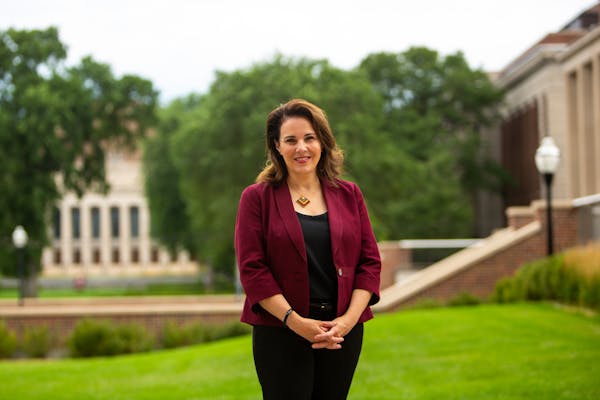A University of Minnesota regent, a law professor and a former governor on Friday asked state and federal agencies to investigate U President Joan Gabel's position on Securian Financial's board of directors.
"As a high-profile public employee, President Gabel's service on the Securian Board of Directors constitutes the most fundamental conflict of interest in that one cannot serve as a fiduciary for two entities with millions of dollars in business between them at the same time," said the letter from Regent Darrin Rosha, U law professor Richard Painter and former Gov. Arne Carlson to the U.S. Securities and Exchange Commission and the Minnesota Attorney General's Office.
The trio added: "This arrangement poses the critical question: Who serves the interests of University of Minnesota employees?"
Gabel, in a statement to the Star Tribune on Friday, said the letter contained "multiple inaccuracies and misleading claims," and noted that she went through the university's conflict management processes before accepting a paid position on Securian Financial's board.
Earlier this month, the U's Board of Regents voted 9 to 3 to allow Gabel to take the position. In exchange, she agreed to recuse herself from any decisions on contracts involving the university and Securian Financial or its affiliates. Rosha was one of the three who voted no.
The university pays about $4.6 million each year to Minnesota Life, a Securian Financial affiliate, to cover basic life insurance for its employees, according to a letter written by leaders of the university's Conflict of Interest Program and Institutional Conflict Review Panel. The U transferred its retirement plan administration from Securian to Fidelity in 2020 but still has about $1.3 billion in "legacy business" with it, according to that letter.
The letter by Rosha, Painter and Carlson says that "a senior University administrator" — whom they do not name — "revealed to Regent Rosha that Securian had discussed service on its Board of Directors with President Gabel about 'two years ago.'" That timing, the trio said, was "particularly alarming."
They told the state and federal agencies they "are concerned that this rushed decision appears to be what is known as a 'pay for play' arrangement or a case of self-dealing."
Jeff Bakken, a spokesman for Securian, said the company "has long benefited from the perspectives of higher education leaders serving on our board" and a national search firm in 2020 identified Gabel as a potential candidate for a vacancy.
Bakken said they were impressed by Gabel's background and leadership roles, including her experience as chair for Florida State University's Department of Risk Management/Insurance. He said the search firm contacted Gabel in 2020 "but she indicated she was not interested in exploring the appointment" and her name resurfaced this year, when the higher education representative on their board left.
"We are proud of our long business relationship with the University of Minnesota," Bakken said, "but this relationship was not a factor in Ms. Gabel's appointment to our board."
In her statement, Gabel said much of the work to transition the university's retirement plan began before she joined the U in July 2019.
She said that in 2014 the university retained a firm to explore how "to reduce what was at the time five retirement plan administrators to a single one." She said regents approved the selection of Fidelity in 2018. The university worked "throughout 2019" to complete the contract, and implementation was delayed from March 2020 to that summer "due to market volatility associated with the pandemic," she said.
Gabel said her conflict management plan "removes me from the selection if and when the University chooses to evaluate new life insurance offerings for our employees, and of any role in the management of the University's retirement plan governance."
She said the selection and management of retirement plans is overseen by a committee that reports to the Board of Regents, which "would seem to be an important fact that the letter writers omitted."
The Minnesota Attorney General's Office didn't immediately comment. Messages left with spokespeople for the U.S. Securities and Exchange Commission were not returned.
Gabel is set to earn about $1 million from the University of Minnesota each year, after factoring in supplemental retirement contributions, a performance bonus and other allowances. She told regents the position on Securian's board pays about $130,000 per year. It begins on Sunday.
Rosha, a lawyer, served as a regent from 1989 to 1995 and joined the U board again in 2015. Painter, a lawyer who previously worked in the White House Counsel's Office, has worked on efforts to deter securities fraud and improve corporate ethics, according to his university biography. Carlson served as Minnesota governor from 1991 to 1999 after having held the roles of state auditor and state representative, among other offices.

Want to share info with the Star Tribune? How to do it securely

'Safe recovery sites' would offer syringes, naloxone and more to people using drugs. The plan could be in peril.
New Minnesota GOP leaders seek peace with party's anti-establishment wing

Who is Republican Lisa Demuth, Minnesota's first House speaker of color?

